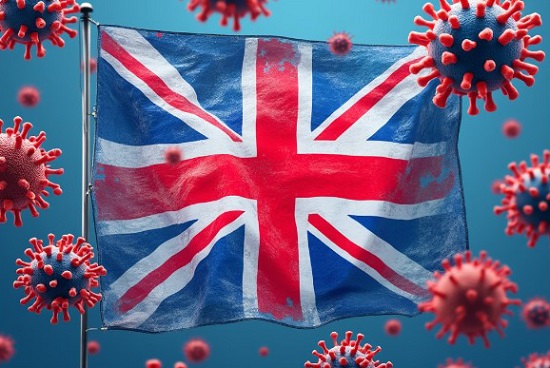Winter Respiratory Viruses Surge Across UK, RSV, Flu, and COVID-19 Threaten to Overwhelm Hospitals
Nikhil Prasad Fact checked by:Thailand Medical News Team Nov 22, 2024 4 months, 2 weeks, 6 days, 22 hours, 4 minutes ago
Medical News: The winter season is ushering in a worrying rise in respiratory illnesses across England, with the UK Health Security Agency (UKHSA) issuing urgent warnings about a surge in respiratory syncytial virus (RSV), influenza, and COVID-19. This
Medical News report examines the alarming trends revealed in the agency's latest flu and COVID-19 surveillance report, updated as of November 21, 2024, and offers insights into preventative measures, especially for vulnerable groups.
 Winter Respiratory Viruses Surge Across UK, RSV, Flu, and COVID-19 Threaten to Overwhelm Hospitals
Winter Respiratory Viruses Surge Across UK, RSV, Flu, and COVID-19 Threaten to Overwhelm Hospitals
Image: AI-Generated
RSV on the Rise: A Threat to Children Under Five
RSV, a common respiratory virus, is causing an increasing number of hospitalizations among children under five. The UKHSA reports that RSV positivity has climbed to 12.1%, up from 9.3% the previous week, with the highest positivity rate recorded among children under five at a staggering 39.5%. Hospitalization rates in this age group have surged to 39.19 per 100,000, marking a significant increase from 24.32 per 100,000 just a week ago.
RSV typically manifests as mild cold-like symptoms in most individuals but can lead to severe conditions such as bronchiolitis or pneumonia in young children and older adults. "Parents should watch for signs of serious illness, including worsening coughs, difficulty breathing, and trouble feeding," advised Dr. Jamie Lopez Bernal, Consultant Epidemiologist at UKHSA. He emphasized, "Trust your instincts and seek medical care if your child appears seriously unwell."
For the first time, the UK has introduced RSV vaccines for pregnant women during their 28th week of pregnancy and for adults aged 75-79. These vaccines aim to protect infants through passive immunity and safeguard older adults, who are also at risk of severe complications.
Influenza Infections Escalate
Influenza cases are steadily climbing, with a positivity rate of 3.9%, compared to 3.3% the previous week. Hospital admissions for flu also increased, reaching 1.28 per 100,000 from 1.05 per 100,000. The report highlighted that children aged 5 to 14 years had the highest flu positivity rates at 11.6%.
Weekly influenza vaccine uptake has shown a mixed pattern. While vaccination rates among pregnant women are slightly higher than last season, rates among other age groups remain comparable or slightly lower. "Vaccination remains the most effective way to prevent severe flu cases and protect vulnerable populations," noted Dr. Mary Ramsay, Director of Public Health Programs at UKHSA.
COVID-19 Levels Declining but Still Present
COVID-19 indicators have shown a decline, with hospital admissions decreasing to 1.82 per 100,000 from 2.19 per 100,000. However, the virus is still circulating, particularly among the elderly. Positivity rates among individuals aged 85 and older remain the highest at 16.4%.
Dr. Bernal cautioned, "
Although COVID-19 activity is at baseline levels, we expect all respiratory illnesses to increase as we approach the peak of winter. Symptoms such as high fever, cough, and fatigue should prompt individuals to limit contact with others, especially those most vulnerable."
Norovirus and Other Respiratory Threats
The report also highlighted an uptick in cases of norovirus, a highly contagious virus causing vomiting and diarrhea. A new variant, GII.17, has emerged as the dominant strain, further complicating the public health landscape. Norovirus positivity has risen sharply, prompting calls for strict hygiene measures.
Additionally, other respiratory viruses like rhinovirus and adenovirus are circulating at moderate levels. Rhinovirus positivity, for instance, has increased to 13.7%, with the highest rates observed in children under five.
Preventative Measures: Vaccination and Hygiene
Health officials are emphasizing the importance of vaccination against RSV, flu, and COVID-19 for eligible groups. Pregnant women, individuals over 75, and those in high-risk categories are strongly encouraged to receive these vaccines.
Practical measures to reduce the spread of RSV and other viruses include:
-Frequent handwashing with soap and water
-Regularly cleaning and disinfecting surfaces
-Avoiding close contact with sick individuals
-Keeping symptomatic children at home to prevent outbreaks
Boots and independent pharmacies are also offering RSV vaccines privately for those not eligible for the NHS program. Costs range from £245 to £350, depending on the provider.
The Broader Context: A Quadruple-Demic Threat
Experts warn of a potential "quadruple-demic" this winter, driven by concurrent surges in RSV, influenza, COVID-19, and norovirus. This scenario poses a significant threat to the healthcare system, which is already under strain from rising emergency department visits and hospital admissions.
The UKHSA's syndromic surveillance has reported increased attendances for acute respiratory infections and bronchiolitis, particularly in children. Calls to NHS 111 for respiratory concerns have also spiked.
Conclusion: A Call for Vigilance
The latest surveillance data underscores the urgent need for vigilance and proactive measures to mitigate the impact of respiratory viruses this winter.
https://www.gov.uk/government/statistics/national-flu-and-covid-19-surveillance-reports-2024-to-2025-season/national-flu-and-covid-19-surveillance-report-21-november-week-47
RSV and flu vaccination, proper hygiene, and timely medical intervention can play a crucial role in reducing the burden on individuals and healthcare systems alike.
For the latest updates on the situation in UK, keep logging in to Thailand
Medical News.
Read Also:
https://www.thailandmedical.news/news/covid-19-cases-rise-in-japan-for-the-first-time-in-three-months-driven-by-the-highly-contagious-xec-variant
https://www.thailandmedical.news/news/human-h5n1-case-confirmed-in-oregon-amid-rising-h5n1-human-cow-and-poultry-infections-in-california
